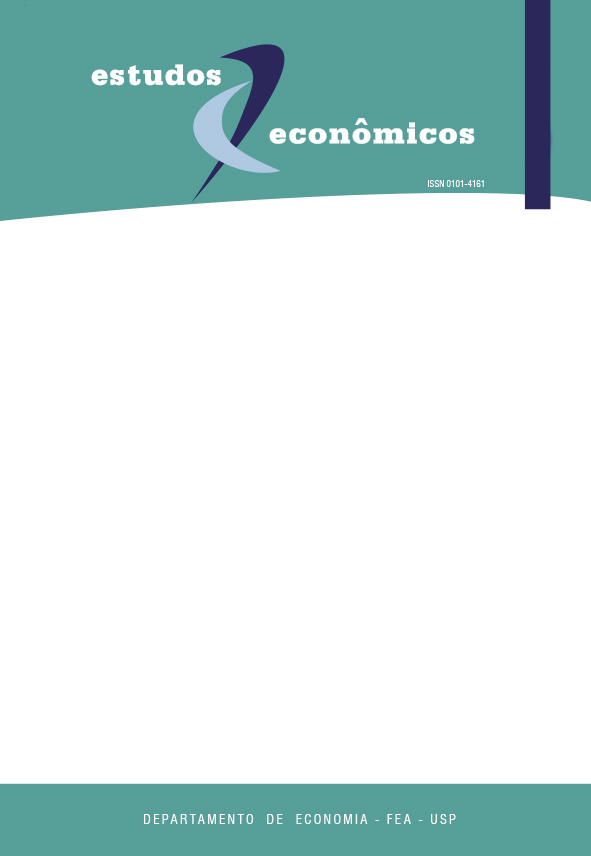Testando a hipótese de ciclos eleitorais racionais nas eleições dos municípios paulistas
DOI:
https://doi.org/10.1590/S0101-41612005000200003Keywords:
electoral cycles, public municipal budget, panel data, probit^i2^slogit modAbstract
The purpose of this paper is, considering the theoretical approach proposed by Rogoff & Si-bert (1988) and Rogoff (1990), to attempt to find out evidences of rational budget cycles in São Paulo state municipalities, between 1989 and 2001, by using panel data and binary dependent variable (probit and logit) econometric models. Evidences of positive expenditure impulses in electoral years were found for those unities and, although the results for 2000 are different from the results obtained for 1992 and 1996, there is no acceptance of the hypothesis of voters' rationality in the way predicted by the rational opportunistic cycle theory.Downloads
References
ALESINA, Alberto. Macroeconomic policy in a two-party system as a repeated game. Quarterly journal of Economics, n. 102, p. 651-678, 1987.
BRENDER, Adi; DRAZEN, Allan. Where does the political budget cycle really come from? Disponível [Online] em: http://papers.ssrn.com/sol3/papers.cfm?abstract_id=462820, 2003.
DRAZEN, Allan. Political economy in macroeconomics. Princeton: Editora Princeton
University Press, 2002.
HIBBS JR., Douglas A. Political parties and macroeconomic policy. American Political Science Review, n. 71, p. 1467-1487, 1977.
HSIAO, Cheng. Analysis of panel data. Cambridge: Editora Cambridge University Press, 1986.
ITO, Takatoshi. Endogenous election timings and political business cycles in Japan.
NBER Working Papers. Disponível [Online] em: http://www.nber.org/papers/w3128. Setembro 15, 2002.
LISBOA, Marcos; MENEZES-FILHO, Naércio. Microeconomia e sociedade no Brasil.
Rio de Janeiro: Editora Contra Capa, 2001.
NICKELL, Stephen. Biases in dynamic models with fixed effects. Econometrica, v. 49, n. 6, p. 1417-1426, 1981.
NORDHAUS, William. The political business cycle. Review of Economic Studies, n.42, p. 169-190, 1975.
PERSSON, Torsten; TABELLINI, Guido. Do electoral cycles differ across political systems?. Disponível [Online] em: http://papers.ssrn.com/sol3/papers.cfm?abstract_id=392643#PaperDownload. Outubro 23, 2003.
PETTERSON – LIDBOM, Per. A test of the rational electoral-cycle hypothesis. 2001.
Disponível [Online] em: http://www.courses.fas.harvard.edu/~gov3007/Electoralcycle.doc. Setembro 20, 2002.
ROGOFF, Kenneth; SIBERT, Anne. Elections and macroeconomic policy cycles. Review of Economic Studies, n. 55, p. 1-16, 1988.
ROGOFF, Kenneth. Equilibrium political budget cycles. The American Economic Review,
n. 80, p. 21-36, 1990.
SHI, Min; SVENSSON, Jakob. Political business cycles in developed and developing countries. 2002. Disponível [Online] em: http://www.iies.su.se/~svenssoj/
pbc1.pdf. Outubro 15, 2003.
WOOLDRIDGE, Jeffrey. Econometric analysis of cross section and panel data. Boston: The MIT Press, 2001.
Downloads
Published
Issue
Section
License
Copyright (c) 2005 Sergio Naruhiko Sakurai

This work is licensed under a Creative Commons Attribution-NonCommercial 4.0 International License.
By submitting an article, the author authorizes its publication and attests that it has not been submitted to any other journal. The original article is considered final. Articles selected for publication are proofread for grammatical and orthographic errors. The journal does not pay rights for published articles. The Institute of Economic Research from the School of Economics, Business and Accounting of the University of São Paulo (Instituto de Pesquisas Econômicas da Faculdade de Economia, Administração e Contabilidade da Universidade de São Paulo) owns the journal's copyright.




